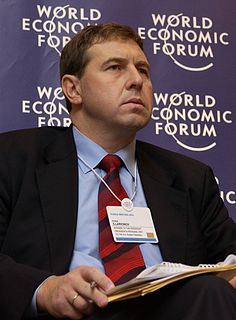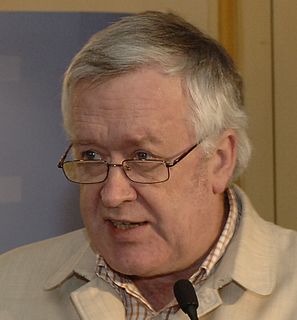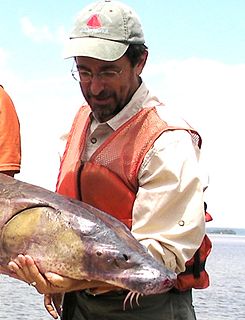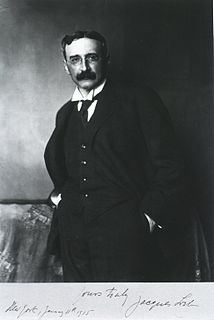Top 175 CO2 Quotes & Sayings - Page 3
Explore popular CO2 quotes.
Last updated on April 15, 2025.
Sometimes people will have a heart attack or some devastating personal loss, and after that, their political views change completely, and their behavior changes completely. It's not because somebody persuaded them to look at the graph on CO2 and temperature, and they finally saw the evidence and were persuaded. Something else changed that allowed them to see and to hear. What is that something else? How can we cultivate that in people without them having to go through a heart attack? The interpersonal things we do change the substructure of our systems. They are political.
Even if we planted a tree on every square yard available in the planet by the end of the century we would only capture at most 10 percent of the CO2 we need to reduce. This does not mean that we should not plant trees; we should, for biodiversity's sake, and for our long-term future together with the other species.
A lot of what is done by the climate lobby is anti-science. But there is some science behind it. Like, there are greenhouse gases, and they do contribute to warming. But if you look at the last, say, 160 years, the first 80 of that period, they went up about four-tenths of a degree. And now, the second 80 that CO2 has increased by, what, 30 percent or something, it's gone up five-tenths of a degree. And there's been in the last 30 or 40 years, there's been no real increase in storms or bad weather.
We need to put a price on carbon, and that's what cap-and-trade does and that's also what a CO2 tax does. As long as our current valuation in the marketplace tells us every minute of every day that it's perfectly all right to dump 90 million tons of global warming into the thin atmosphere surrounding the planet every 24 hours as if that atmosphere is an open sewer, then the individual actions are not going to solve the problem.
The majority of humankind does not accept this system, despite claims of worldwide support. Even with Russia's ratification, 75% of the world's CO2 is emitted by, 68% of the world's GDP is produced in, and 89% of the world's population live in countries that are not handcuffed by Kyoto's restrictions. Like fascism and communism, Kyotoism is an attack on basic human freedoms behind a smokescreen of propaganda. Like those ideologies of human hatred, it will be exposed and defeated.
Attributing global climate change to human CO? production is akin to trying to diagnose an automotive problem by ignoring the engine (analogous to the Sun in the climate system) and the transmission (water vapour) and instead focusing entirely, not on one nut on a rear wheel (which would be analogous to total CO2) but on one thread on that nut, which represents the human contribution.
We can no longer completely avoid anthropogenic climate change. At best, limiting the temperature rise to two degrees is just about possible, according to optimistic estimates. That's why we should spend more time talking about adjusting to the inevitable and not about reducing CO2 emissions. We have to take away people's fear of climate change.
No chemical compound in the atmosphere has a worse reputation than CO2, thanks to the single-minded demonization of this natural and essential atmospheric gas by advocates of government control and energy production. The incredible list of supposed horrors that increasing carbon dioxide will bring the world is pure belief disguised as science.
I think people become environmentalists through experiences of beauty and grief. There was that pond that you visited when you were a child, and there were frogs and turtles. You go back there and it's dead now. The forest you went to, now there are bulldozers, now it's a strip mall. These experiences of beauty followed by grief affect us more than learning that CO2 levels are now 400 parts per million.
For me the two biggest issues are climate change and animal welfare/animal agriculture. And oddly enough animal agriculture is such a contributor to climate change. According to the United Nations, 25% of climate change comes from animal agriculture, so every car, bus, boat, truck, airplane combined has less CO2 and methane emissions than animal agriculture.
A billion homo sapiens are added every 11 years to the planet. The hypertrophy of a single species pushes other life-forms out of bed and into extinction. The decline of biological diversity is real and severe. The alarming loss of soil fertility, forest cover, and coral reef viability and the release of fossilized CO2 that nature put away 300 million years ago in its march toward greater diversity - all these "losses" and many others are the result of one life-form annihilating other life-forms in its immoral confusion of "dominion" with "domination."
Injecting CO2 into an underground reservoir would certainly change the local environment and thus affect the organisms that live there. Some will thrive, and others will suffer. While we should minimize such impacts, they cannot be avoided completely. The same happens when one plows a field, builds a house or a road, or waters a lawn.
The US in some ways has been the best. Who figured out shale gas? Although that wasn't a good thing [for CO2 levels], it was very innovative. It's led to low-cost energy. Who figured out nuclear power? Largely the United States. Once you get past the steam engine, which is mostly British, then the US has been at the center of most of the energy things that have happened.
We need to raise the level of our game in terms of explaining the planetary warming by infrared absorption of CO2 etc. The missing area of understanding seems to be the actual physical mechanism. Lets target an explanation at an audience that has taken 1 year each of undergraduate physics and chemistry, plus calculus. Once we have something that is convincing at this level, we can work on how to communicate this to the interested public (i.e. those that hang out in the climate blogosphere). Willis Eschenbach’s help is needed in translating this for the WUWT crowd.
The main point is that I think if we want the Earth to survive and everybody to have a positive future, we have to stop thinking in terms of religions and races. We have to face that we are all on the planet Earth together, and we have to figure out how we all survive. It makes no sense if we are all driving hybrid cars, but China pumps massive amounts of CO2 in the air. If we don't start working together and find solutions - if every country thinks only in terms of, "First we, then the other nations" - then we will fail.
I believe the earth gets warmer, and I also believe the earth gets cooler, and I think history points out that it does that and that the idea that man through the production of CO2 which is a trace gas in the atmosphere and the manmade part of that trace gas is itself a trace gas is somehow responsible for climate change is, I think, just patently absurd when you consider all of the other factors.
CO2 cannot cause global warming. I'll tell you why. It doesn't mix well with the atmosphere, for one. For two, its specific gravity is 1 1/2 times that of the rest of the atmosphere. It heats and cools much quicker. Its radiative processes are much different. So it cannot - it literally cannot cause global warming.
Natural gas obviously brings with it a number of quality-of-life environmental benefits because it is a relatively clean-burning fuel. It has a CO2 footprint, but it has no particulates. It has none of the other emissions elements that are of concern to public health that other forms of power-generation fuels do have: coal, fuel oil, others.
I'm not a global warming believer. I'm not a global warming denier. I'm a global warming agnostic who believes instinctively that it can't be very good to pump lots of CO2 into the atmosphere but is equally convinced that those who presume to know exactly where that leads are talking through their hats.
The difference between a healthy environment and an unhealthy environment can be summed up in one word, and it's not 'CO2' or 'climate' or 'temperature.' It's 'development.' [...] Whether you're drinking clean drinking water, listening to a thunderstorm with pleasure instead of fear, or going to the Grand Canyon, you should be thanking Big Coal, Big Oil, and Big Gas.
Those individuals from the far left, and I'm talking about the Hollywood elitists and the United Nations and those individuals want us to believe it's because we are contributing CO2 to the atmosphere, that's causing global warming. It's all about money. I mean, what would happen to the Weather Channel's ratings if all the sudden people weren't scared anymore?
Back in 2005, when I was Christopher Eccleston, we saw one of the largest increases on record, of CO2 in the atmosphere. Unless we keep the rise in global temperature to under 2 degrees, by the time I'm Daniel Radcliffe or wee Jimmy Crankie, I won't be able to save the planet. I won't be here to help you -- well I might, but I'll be that bloke who won Any Dream Will Do.
It's not as though we can keep burning coal in our power plants. Coal is a finite resource, too. We must find alternatives, and it's a better idea to find alternatives sooner then wait until we run out of coal, and in the meantime, put God knows how many trillions of tons of CO2 that used to be buried underground into the atmosphere.
We now know that we cannot continue to put ever-increasing amounts of CO2 into the atmosphere. Actions have consequences. In fact, the consequences of past actions are already in the pipeline. Global temperatures are rising. Glaciers are melting. Sea levels are rising. Extreme weather events are multiplying.
It is in fact necessary to reduce CO2 emissions. There is no reason why we shouldn't spend our vacations on (the North Sea island of) Sylt instead of in the Seychelles, or drive more economical cars - for the sake of preserving increasingly scarce resources if nothing else. But that won't enable us to stop climate change. As long as China, India and the United States continue the way they have been, what we Germans do is more or less irrelevant.
In the European Union, a fleet average of 95 grams of CO2 per kilometer will be permitted in 2020. This corresponds to fuel consumption of about four liters (per 100 kilometers; about 59 mpg). We have to continue reducing the fuel consumption of our vehicles and offer hybrid and electric vehicles, or else we will be unable to achieve these values.
There's such a wide variation in tax systems around the world, it's difficult to imagine a harmonized CO2 tax that every country agrees to. That's not in the cards in the near term. But the countries that are doing the best job, like Sweden, are already doing both of these. I think that eventually we'll use both of them but we need to get started right away and the cap-and-trade is a proven and effective tool.
The nuclear approach I'm involved in is called a traveling-wave reactor, which uses waste uranium for fuel. There's a lot of things that have to go right for that dream to come true - many decades of building demo plants, proving the economics are right. But if it does, you could have cheaper energy with no CO2 emissions.
Even though all that CO2 has been spewed and belched into the atmosphere, there isn't any warming. Therefore, the person, people, whatever, predicting global warming for any reason have been wrong for 20 consecutive years. Every year for 20 years the supporters of this theory have been wrong, as wrong as it's possible to be. That means that the person predicting global warming is not credible and does not deserve to be listened to.
Probably the single-most concrete and substantive thing an American, young American, could do to lower our carbon footprint is not turning off the lights or driving a Prius, it's having fewer kids...we'll soon see a market in baby-avoidance carbon credits similar to efforts to sell CO2 credits for avoiding deforestation.
Ocean acidification - the excess carbon dioxide in the atmosphere that is turning the oceans increasingly acid - is a slow but accelerating impact with consequences that will greatly overshadow all the oil spills put together. The warming trend that is CO2-related will overshadow all the oil spills that have ever occurred put together.
It is impossible to talk about slowing climate change without talking about reducing CO2 emissions. Equally, it is impossible to talk about adapting to climate change without considering how we will feed ourselves. And it is out of the question that we can adapt agriculture without conserving crop diversity.
When Arnold Schwarzenegger goes to his reward - how's that? That's a crack, but I treat Governor Schwarzenegger well in my book. He's done such great work in California; we'll forgive him one personal habit. Everybody should have one not-totally-CO2-friendly habit they can be forgiven for. So we'll forgive him that one.
If you ever really want to get away from it all and see something that you have never seen, and have an excellent chance of seeing something no one has ever seen, get in a sub. You climb in, seal the hatch, turn on a little oxygen, turn on the scrubber, which removes the CO2 in the air you breathe, and they chuck you overboard. Down you go.
If you really could take the CO2, when you burn hydrocarbons - coal, for example - if you could really capture the carbon and sequester it - they call it CCS - if the extra capital cost, energy cost, and storage costs over time didn't make it super expensive, then that's another path that you could go down.
Statistics compiled by the German Federal Motor Transport Authority highlight how successfully we have reduced fuel consumption. A few years ago, the CO2 emissions for the BMW brand were at well over 200 grams per kilometer. In 2009, that number was at 159 grams. This puts us below our direct competitors.
We allow it to be dumped into this community asset, which is our one and only atmosphere. So that has to change, and there's really only one entity that can do that. So we have proposed a cap-and-trade system to stop that unlimited pollution, to use the forces of the market to efficiently allocate scarce permits to allow CO2 into the atmosphere. That's just one of 500 things we need to do, but it's probably the granddaddy of them all.
Through the discovery of Buchner, Biology was relieved of another fragment of mysticism. The splitting up of sugar into CO2 and alcohol is no more the effect of a 'vital principle' than the splitting up of cane sugar by invertase. The history of this problem is instructive, as it warns us against considering problems as beyond our reach because they have not yet found their solution.
The European Union and environmental advocacy groups use global warming hysteria to advance their own special agendas. The European Union recognizes any significant reduction in CO2 emissions by the United States will significantly reduce its economic output, thereby bringing it closer to the inferior output of European nations.












































